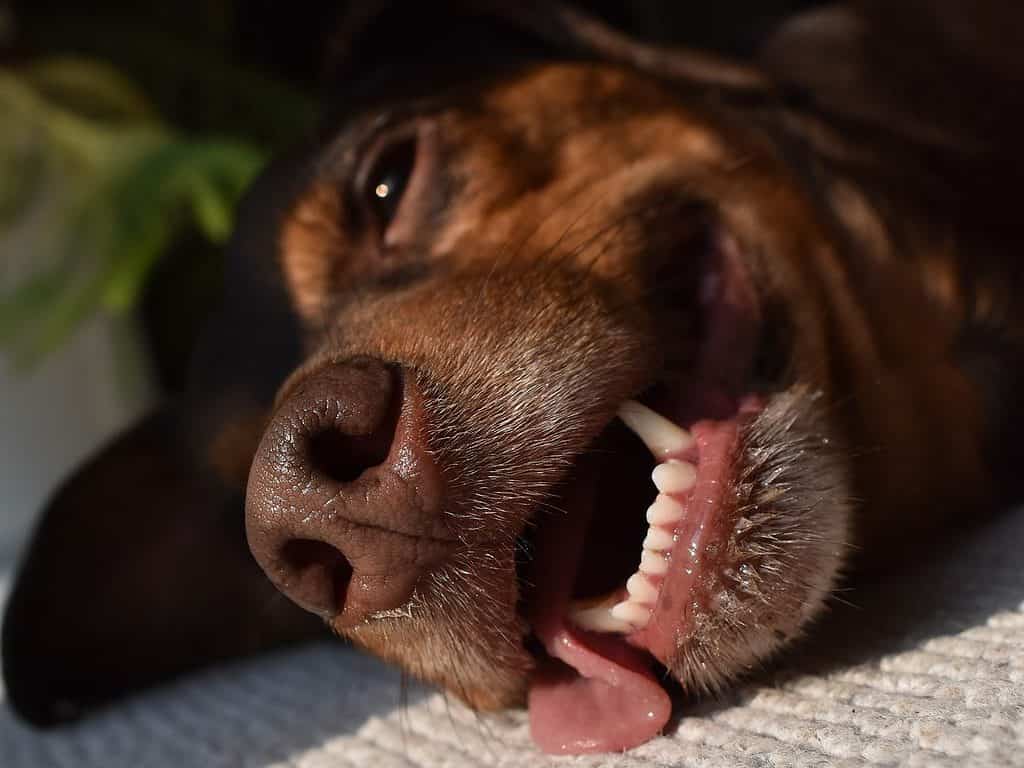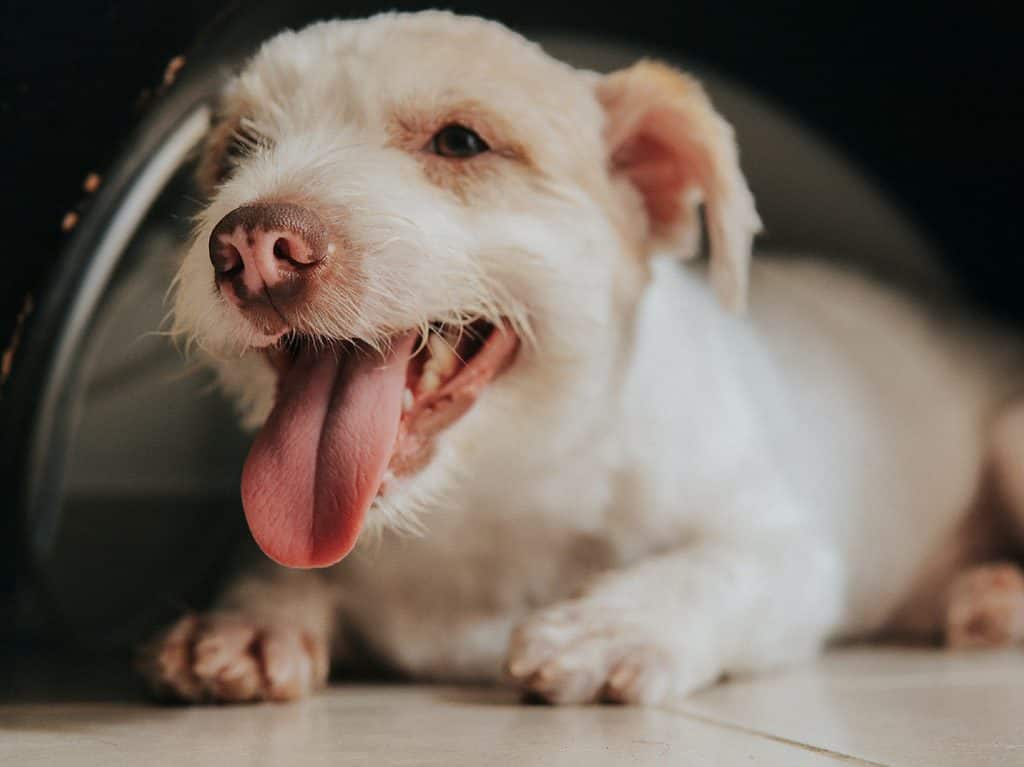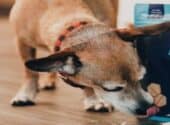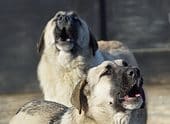Do you find yourself up at night, wondering why your pup is panting excessively? Is it normal behavior or a sign of something more serious? As a pet parent, knowing the answers to these questions is important.
Excessive panting in dogs at night can mean many things: stress and anxiety, obesity, pain, heart disease, and heatstroke.
Take a closer look at the different meanings behind your dog’s excessive panting so that you can take the necessary steps to help your dog sleep soundly again.

Why Do Dogs Pant
We all know dogs pant, but why exactly do they do this?
Dogs primarily cool their bodies down through panting. During hot conditions or after strenuous activity, your pup may pant as they expel warm air and take in cooler air. Dogs lack sweat glands like humans, so they depend heavily upon their mouths and noses to regulate temperature when things get too steamy. Dogs possess sweat glands known as merocrine glands on their paws; they seldom perspire through these glands.
Your furry friend may pant not only to regulate his temperature but also to communicate joy or enthusiasm. This behavior can be observed when dogs play, and anticipate something enjoyable, such as a car ride or during other exciting activities. This type of panting can be differentiated from the labored breathing associated with overheating because it has a more relaxed quality to it.
Identifying Normal Vs Excessive Panting In Dogs
As noted, normal panting occurs when your dog is feeling hot, as it helps regulate its body temperature. This type of panting is usually short and shallow, not accompanied by other symptoms such as drooling or difficulty breathing.
Breeds like Labs and Golden Retrievers are more likely to develop a medical condition known as laryngeal paralysis. This disorder obstructs the airway and impedes it from opening widely. This produces a distinctive harsh noise when these canines pant.
Additionally, certain dog breeds known for their shorter snouts, such as English Bulldogs and Pugs, may produce an abnormal sound when panting due to an elongated soft palate or excess tissue in their throats obstructing adequate airflow.
Excessive panting, on the other hand, can indicate that there may be an underlying health problem or another cause at play. You might notice your pup breathing heavily with its mouth open wide, even if they are resting or not exposed to heat.
Read on to find out the common causes of excessive panting in dogs at night and what can be done about them.
Stress and Anxiety
If your beloved pooch has been exhibiting excessive panting at night, it could signify stress and anxiety. Often overlooked as a symptom of distress, this nocturnal panting may indicate that your pup is feeling overwhelmed by something in his environment.
Your pup needs support to help them relax and sleep through the night without all that extra panting. Fortunately, there are steps you can take to mitigate this problem.
First, determine the root cause of your canine’s distress. Could it be an external factor inducing their anxiety, like a sudden thunderstorm or bright lights? Or maybe you need to give your pup regular exercise throughout the day and develop a specific bedtime routine to ensure they are relaxed. Likewise, establishing a tranquil sleeping environment with minimal sound and lighting can help keep your canine companion calm through the night.
Moreover, many possible solutions exist to reduce excessive panting in dogs at night due to separation anxiety.
Try leaving them with interactive toys like puzzles that keep them engaged and distracted during periods when you’re away from home.
In addition, providing comfort items such as extra bedding or blankets may also help ease their anxieties during the night time. You can also try setting up a routine before bedtime that includes soothing activities like a gentle massage, brushing their fur, or playing calming music.
Obesity
Obesity occurs when a dog consumes more calories than they burn, accumulating fat that strains its lungs. This means pets will become increasingly out of breath after minimal exercise or activity, even as much as simply sleeping, resulting in heavy panting at night.
In addition, obesity can bring about other conditions, such as heart disease or arthritis, that make breathing more labored for your furry friend.
There are plenty of solutions for this issue, depending on how severe the problem is.
The most important step is managing your dog’s weight by ensuring they stick to a healthy diet and exercise plan. This can be achieved by reducing their daily calorie intake while increasing their activity level with regular walks and playtime activities. You should also talk to your vet about medications or dietary supplements that may help reduce your pet’s nightly panting.
Pain
Most dog owners are familiar with the occasional panting at night. Still, when it starts to become excessive, it could signify something more serious, such as an underlying condition or injury. That’s right: excessive panting in dogs at night could be due to pain.
Take your pup to the vet so they can assess any potential injuries or illnesses they may have sustained. Depending on the diagnosis, they will likely prescribe medications to help with pain relief and healing.
Heart Disease
Heart disease in dogs is not uncommon and can be caused by aging, genetics or even an unhealthy diet. Unfortunately, just like humans, dogs don’t always show signs until the condition becomes more severe. Excessive panting at night could be one of the earliest warning signs that your pup needs medical attention from a vet as soon as possible.
The good news is that treatments are available to help manage the symptoms associated with heart disease in dogs. By ensuring regular checkups with your veterinarian and following any dietary or lifestyle changes recommended, you can give your pup the best chance for a long and healthy life.
Heat Stroke

Dogs exposed to abnormally high temperatures often exhibit excessive panting. Additionally, they could demonstrate signs of distress, such as agitation and complete disregard for their owners.
As a pet parent, taking precautionary measures against heatstroke or overheating on hot summer nights is crucial.
Those breeds with flat snouts are more apt to suffer from heat stroke and should maintain a constant temperature and fluid intake.
Similarly, never leave your dog inside a parked car during hot days, no matter how short of an errand. Even if it’s just for a few minutes, the temperature inside your vehicle could climb quickly and become dangerous for your pup in such a small space. The car’s interior can reach scorching temperatures within 15 minutes when sitting in direct sunlight, so don’t take any chances.
References
Sherman, B. L. (2008). Separation anxiety in dogs. Compendium, 30(1), 27-42.
Ogata, N. (2016). Separation anxiety in dogs: What progress has been made in our understanding of the most common behavioral problems in dogs?. Journal of Veterinary Behavior, 16, 28-35.
Colliard, L., Ancel, J., Benet, J. J., Paragon, B. M., & Blanchard, G. (2006). Risk factors for obesity in dogs in France. The Journal of nutrition, 136(7), 1951S-1954S.
Heuberger, R., & Wakshlag, J. (2011). The relationship of feeding patterns and obesity in dogs. Journal of Animal Physiology and Animal Nutrition, 95(1), 98-105.




